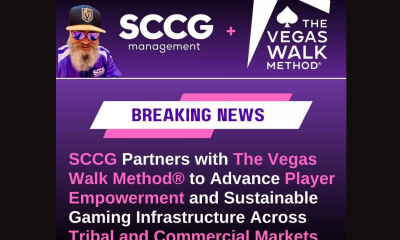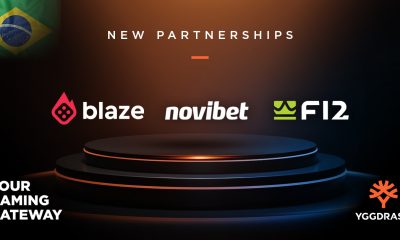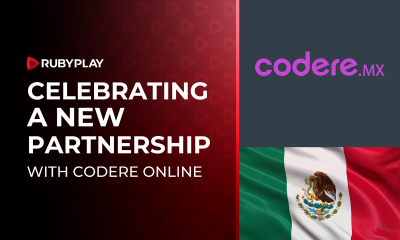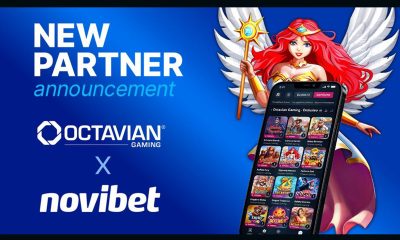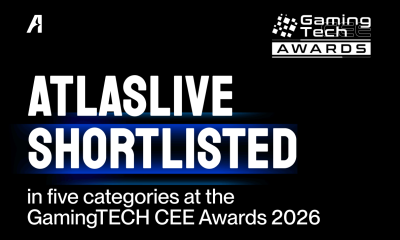Latest News
BETMGM FY23 UPDATE: FY23 NET REVENUE FROM OPERATIONS OF $1.96 BILLION AT TOP END OF GUIDANCE
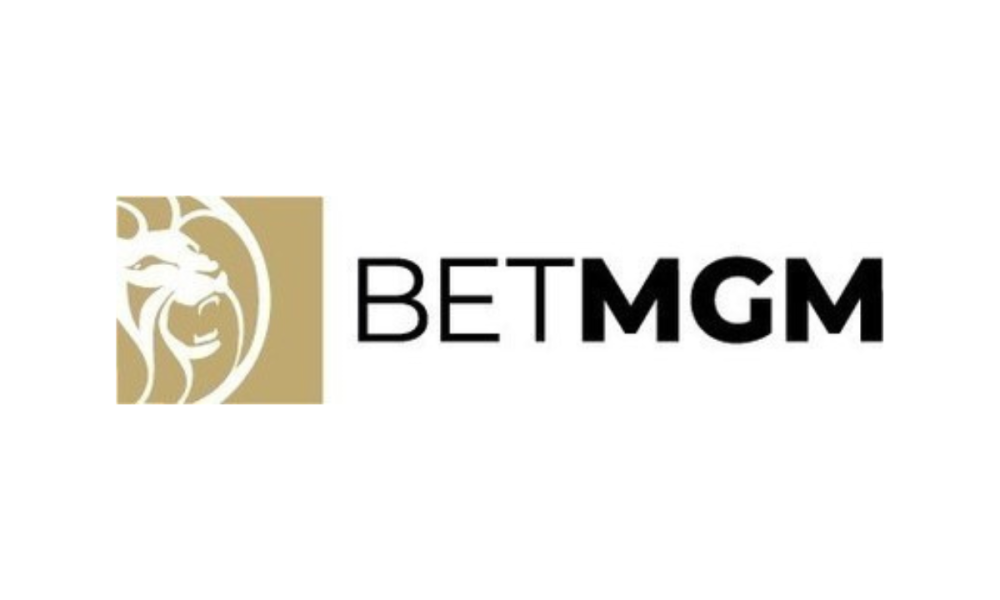
BetMGM, LLC (“BetMGM”), one of the leading sports betting and iGaming operators across the U.S., jointly owned by MGM Resorts International (NYSE: MGM) (“MGM Resorts”) and Entain plc (LSE: ENT) (“Entain”) is today providing an update on performance for FY 2023.
- BetMGM delivered a strong FY 2023 financial performance (based on unaudited results)
- Net revenue from operations grew 36% year over year to $1.96 billion1, at the upper-end of $1.8-$2.0 billion guidance range2
- Same-state growth in net revenue from digital operations of 14%
- Key metrics across both iGaming and Online Sports Betting improved year over year, including average monthly actives, FTDs, hold percentages, bonus levels, NGR per active, and CPAs3
- EBITDA positive in the second half of 2023 with expected FY 2023 EBITDA loss of approximately $67 million4
- Net revenue from operations grew 36% year over year to $1.96 billion1, at the upper-end of $1.8-$2.0 billion guidance range2
- Established as a leading operator across North America, live in 28 markets with access to 49% of adult population5
- Four new markets launched during the year: Ohio (online and retail), Massachusetts (online and retail), Puerto Rico (online) and Kentucky (online and retail)
- 14% market share in Sports Betting and iGaming in the U.S. and 22% in Ontario6
- Secured market access with Charlotte Motor Speedway ahead of expected March 2024 launch of newly legalised sports betting market in North Carolina, pending regulatory approval
- Further operational progress supported by technology, product and capability enhancements, positions BetMGM to drive growth going forward
- Seamless execution of single account single wallet across 21 markets ahead of the 2023 NFL season
- Enhanced sports betting experience with improved speed7, broader market coverage and new differentiated bet types
- New in-house and exclusive games, including Dual Play Roulette, as well as largest progressive jackpots underpinning market leading iGaming offering
- December 4th BetMGM business update set out strategic roadmap to drive growth in 2024
- Expanding the depth and breadth of our sports offering by leveraging Angstrom’s sophisticated modelling to support innovative and original products, including player-popular Same Game Parlay (“SGP”), SGP+ and new LIVE SGP products
- Continue to deliver market-leading and engaging gaming experiences that are more personalized and differentiated, including exclusive and MGM-branded content
- Increasingly investing in marketing and player acquisition as sports product and player retention continue to improve
- Unlocking BetMGM’s unique omnichannel advantages, particularly in Las Vegas, Nevada
- Launched new improved app in January with single wallet functionality expected later in 2024
- Leveraging Las Vegas sports teams and tentpole events, for example BetMGM’s first Big Game commercial featuring Tom Brady, Wayne Gretzky and Vince Vaughn
- Reiterating guidance from December 2023 business update of targeting approximately $500 million of EBITDA in 2026
- Recognized as Digital Operator of the Year by Global Gaming Awards, Online Casino of the Year by American Gambling Awards, and Casino Operator of the Year by EGR North America and SBC Awards North America.
- Ongoing commitment to industry leadership in player safety and responsible gaming
- Secured five-year extension with GameSense program, providing player tools and capabilities to play responsibly
- Partnered with nine NFL teams to promote responsible gambling in stadiums during games
- Piloted the first of its kind program with Kindbridge Health to evaluate efficacy of offering self-excluded individuals’ referrals for problem gambling treatments
Adam Greenblatt, CEO of BetMGM, commented:
“Our performance in 2023 demonstrates our commitment to delivering on our promises. We were able to achieve strong organic growth, while executing against key strategic initiatives that lay the foundation for 2024 and beyond. The attainment of EBITDA profitability over the last three quarters of 2023 validates the effectiveness of our business model and provides the basis from which to invest further in expanding our sports offering through the integration of Angstrom and leveraging our largely untapped Las Vegas omni-channel advantages. With this comprehensive roadmap in place, we can focus on driving accelerated player acquisition and retention and strengthening our current market position. This clear strategic direction underpins our confidence in achieving our targets and building long-term, sustainable value for shareholders.”
|
Notes |
|
|
(1) |
FY2023 net revenue for BetMGM on a GAAP basis is expected to be approximately $1,920 million, which includes approximately $64 million related to Nevada MGM operations for which BetMGM records on a net basis as BetMGM is considered to be the agent in the Nevada transactions for GAAP purposes |
|
(2) |
FY2023 non-GAAP net revenue guidance established in January 2023 |
|
(3) |
Key metrics include average monthly actives, first time depositors (“FTDs”), hold percentages, bonus levels, net gaming revenue per active (“NGR per active”), and cost per acquisition (“CPAs”) |
|
(4) |
BetMGM has not completed its financial closing procedures for the three months and year ended December 31, 2023 and actual results can differ materially from these estimates. In addition, BetMGM’s independent registered public accounting firm has not audited, reviewed or performed any procedures with respect to these preliminary estimates. During the course of the preparation of BetMGM’s audited financial statements, BetMGM and its auditors may identify items that would require material adjustments to these estimates. As a result, these estimates constitute forward-looking statements and, therefore, investors are cautioned that they are subject to risks and uncertainties, including possible adjustments. |
|
(5) |
BetMGM operates iGaming and Online Sports Betting in five markets and Sports Betting only (combined online and retail) in 23 markets. |
|
(6) |
Market share for last three months ending November 2023 by GGR including only U.S. markets where BetMGM was active; internal estimates used where operator-specific results are unavailable. Ontario market share reflects the three-month period through December 2023. |
|
(7) |
Google Core Web Vitals validate that BetMGM in now one of the fastest apps in the U.S. |
Forward-looking statements:
This document contains certain statements that are forward-looking statements. They appear in a number of places throughout this document and include statements regarding our intentions, beliefs or current expectations and those of our officers, directors and employees concerning, amongst other things, results of our operations, financial condition, liquidity, prospects, growth, strategies and the business we operate. Examples of these statements include, but are not limited to, BetMGM’s expectations regarding its financial outlook (including EBITDA guidance). These forward-looking statements include all matters that are not historical facts. By their nature, these statements involve risks and uncertainties since future events and circumstances can cause results and developments to differ materially from those anticipated. Any such forward-looking statements reflect knowledge and information available at the date of preparation of this document. Among the important factors that could cause actual results to differ materially from those indicated in such forward-looking statements include the significant competition within the gaming and entertainment industry; BetMGM’s ability to execute on its business plan; changes in applicable laws or regulations, particularly with respect to iGaming and online sports betting; BetMGM’s ability to manage growth and access the capital needed to support its growth plans; and BetMGM’s ability to obtain the required licenses, permits and other approvals necessary to grow in existing and new jurisdictions. In providing forward-looking statements, Entain is not undertaking any duty or obligation to update these statements publicly as a result of new information, future events or otherwise, except as required by law. Other than in accordance with its legal or regulatory obligations (including under the Market Abuse Regulation (596/2014), the Listing Rules, the Disclosure Guidance and Transparency Rules and the Prospectus Rules), Entain undertakes no obligation to update or revise any such forward-looking statements. Nothing in this document should be construed as a profit forecast. Entain and its directors accept no liability to third parties in respect of this document save as would arise under English law.
Non-GAAP Financial Information:
This press release includes net revenue from operations and estimated EBITDA, which have not been prepared in accordance with GAAP. BetMGM believes this presentation, which it uses for its own analysis of operations, is useful in that it reflects the true economic performance of the business. If BetMGM presented net revenue from operations in accordance with GAAP, then BetMGM would present the revenues associated with its Nevada digital and retail sports betting operations different, until such time as BetMGM is licensed as a Nevada gaming operator. Currently under GAAP, its calculation of Net Revenue would be on a basis net of operating costs, such that the GAAP reported Net Revenue would be lower than the Net Revenue reported herein, with Net Income remaining the same.
apuestas
Expansión de los VLT en Brasil y crecimiento del sector hotelero

Mientras el Congreso Nacional aún debate los detalles finales para la implementación de casinos integrados en resorts, el operador To All Games ejecutó un movimiento estratégico que redefine el concepto de “gaming retail” en Brasil.
Al firmar un acuerdo con el Instituto de Desarrollo, Turismo, Cultura, Deportes y Medio Ambiente (IDT-CEMA), la empresa comenzará a instalar Video Lottery Terminals (VLTs) en hoteles de alta gama.
Este movimiento, anunciado durante SBC Summit Rio, utiliza la licencia operativa emitida por Loterj (Lotería del Estado de Río de Janeiro) para crear una red física de entretenimiento segura y altamente tecnológica.
El proyecto de To All Games no es simplemente una expansión de máquinas.
Es una inversión en infraestructura de gaming dentro del sector hotelero.
Cada terminal está equipada con sistemas de ciberseguridad y monitoreo de ubicación en tiempo real.
Los pagos se aceptan exclusivamente a través de Pix.
Para el sector hotelero, la introducción de estas salas de juego integradas representa un cambio en el modelo de negocio.
Los lobbies y áreas comunes se convierten en centros auxiliares de ingresos que atraen turistas y aumentan el tiempo de permanencia de los huéspedes.
Al llevar el gaming al entorno controlado de los hoteles, To All Games está creando un “caballo de Troya” beneficioso para el turismo.
Demuestra que la coexistencia entre entretenimiento regulado y servicios de lujo es el camino más rápido hacia la aceptación social del gaming físico en Brasil.
El estado como gestor de daños: teleasistencia del SUS a través de “Meu SUS Digital”
Uno de los temas más sensibles y urgentes de 2026 es la salud mental de los apostadores.
El ministro de Salud, Alexandre Padilha, llevó al debate público una dura realidad financiera.
Las apuestas en línea generan pérdidas económicas y sociales estimadas en R$38.8 mil millones por año en Brasil.
Para mitigar este impacto, el gobierno lanzó, en asociación con el Hospital Sírio-Libanês, un servicio de teleasistencia sin precedentes especializado en adicción al juego.
El servicio es accesible a través de la aplicación Meu SUS Digital.
Los usuarios completan un autotest científicamente validado y, si se detecta un riesgo moderado o alto, son derivados automáticamente a consultas por videollamada.
Esta iniciativa prevé inicialmente 600 consultas mensuales con potencial para expandirse a 100,000.
Está compuesta por un equipo multidisciplinario de psicólogos, terapeutas ocupacionales y psiquiatras.
El hecho de que el sistema público de salud brasileño ofrezca hasta 13 sesiones gratuitas por paciente, incluido el apoyo para familiares, cambia el tono de la conversación en torno al iGaming en Brasil.
Para la industria, contar con el apoyo del sistema público no es una amenaza.
Es una protección reputacional.
Un mercado que ofrece tratamiento y autoexclusión centralizada es un mercado que se protege contra crisis de imagen y retrocesos legislativos.
La sostenibilidad del sector en 2026 depende de esta simbiosis entre las ganancias de los operadores y la red de protección social del Estado.
La guerra contra el mercado ilegal: El asedio del 30% restante
A pesar del éxito del mercado regulado, la Secretaría de Premios y Apuestas todavía enfrenta a un enemigo resiliente.
El mercado ilegal aún representa alrededor del 30% del volumen total de apuestas en Brasil.
En 2025, las acciones de fiscalización resultaron en el cierre de más de 25,000 sitios web ilegales.
Sin embargo, el gobierno sabe que el bloqueo de IP por sí solo no es suficiente.
Por esta razón, el primer trimestre de 2026 marca la implementación de responsabilidad solidaria para bancos e instituciones de pago.
Tras la actualización de la Ordenanza 561, las instituciones financieras serán notificadas y responsabilizadas si facilitan transacciones para operadores sin licencia del SPA.
Esta ofensiva técnica y automatizada busca asfixiar el flujo financiero del juego ilegal.
La estrategia del gobierno es hacer que las operaciones clandestinas sean tan riesgosas y costosas que los usuarios migren naturalmente hacia plataformas autorizadas.
Además, el estricto control publicitario en asociación con CONAR y el Consejo Digital busca impedir que los anuncios de sitios ilegales lleguen a redes sociales e influencers.
El enfoque de 2026 es la aplicación efectiva de las normas.
El SPA ya anunció que iniciará severos procesos sancionadores contra cualquier operador autorizado que viole las reglas de protección al consumidor y de prevención de lavado de dinero.
Fútbol e integridad: El impacto de R$1.2 mil millones en patrocinios
El fútbol brasileño es, sin duda, el mayor beneficiario directo de la regulación.
En 2024, los clubes de la Serie A recibieron aproximadamente R$1.2 mil millones en patrocinios de empresas de apuestas.
Esto representa cerca del 35% de los ingresos totales por patrocinio del deporte.
Giovanni Rocco destacó que en 2025 esta relación se consolidó con contratos de largo plazo y mayor previsibilidad financiera para los equipos.
Sin embargo, el volumen de dinero exige un control estricto sobre la integridad deportiva.
El gobierno creó un grupo de trabajo interministerial para formular la Política Nacional de Combate al Match-Fixing.
Más de 500 agentes de seguridad pública ya han sido capacitados en técnicas para detectar fraude en cuotas y monitorear mercados de apuestas.
La idea es que el Ministerio de Deportes anticipe estrategias de prevención a través de inteligencia deportiva, analizando patrones sospechosos en mercados ilegales.
Además, las empresas que comercializan predicciones y análisis estadísticos ahora deben obtener una licencia del SPA para operar legalmente.
Esto garantiza que el ecosistema de datos que rodea al deporte no sea utilizado para inducir errores o facilitar esquemas de corrupción.
Brasil 2026: la nueva realidad del gaming
El cierre de SBC Summit Rio 2026 este jueves 5 de marzo no es simplemente el final de otro evento en el calendario.
Marca el punto cero de una nueva era para el mercado de apuestas en América Latina.
Después de doce meses operando bajo el marco regulatorio completo que entró en vigor el 1 de enero de 2025, Brasil dejó de ser una “promesa de futuro” y se convirtió en el mercado de gaming más complejo y monitoreado del planeta.
Los datos presentados esta semana en el Windsor Convention & Expo Center revelan un mercado que movió R$68 mil millones solo en el último año.
Esto consolida una industria que ahora alcanza directamente a 25 millones de brasileños adultos.
Sin embargo, lo que define marzo de 2026 no es solo el volumen de transacciones.
Es la sofisticación de las capas de control que ahora abarcan desde el sistema financiero a través de Pix hasta la red pública de salud mental.
La anatomía del gigante: una radiografía del mercado brasileño en 2025
La Secretaría de Premios y Apuestas del Ministerio de Hacienda (SPA-MF), bajo el liderazgo de Daniele Correa Cardoso y Giovanni Rocco, presentó un informe que funciona como una brújula para cualquier inversor serio.
El mercado brasileño demostró ser resiliente y extremadamente capilarizado.
Los R$68 mil millones manejados generaron ingresos fiscales directos de R$3.2 mil millones, de los cuales R$800 millones se destinaron inmediatamente al financiamiento de programas deportivos y educativos.
Esta transparencia financiera es el resultado directo de la estructura organizativa del SPA, que opera con la agilidad de una agencia reguladora.
Está dividida en subsecretarías de Autorización, Monitoreo e Inspección, y Acción Sancionadora.
Por primera vez en la historia, el Estado brasileño comprende completamente a los socios, ejecutivos y flujos de caja de cada operador autorizado.
Este nivel de visibilidad permitió identificar que aproximadamente el 11.83% de la población adulta del país realizó al menos una apuesta en 2025.
Pero el éxito numérico trae consigo responsabilidad de control.
El gobierno implementó mecanismos de cruce de registros y bloqueo de transacciones sospechosas en una asociación sin precedentes con el Banco Central y la Policía Federal.
El objetivo para 2026 es claro.
Elevar el cumplimiento normativo a un nivel en el que no respetar los límites de depósito o no comunicar los riesgos resulte en la suspensión inmediata de la licencia, garantizando que solo los operadores más robustos sobrevivan a la fase de consolidación del mercado.
La ofensiva de contenido: Yggdrasil y las exigencias del jugador brasileño
Entre los proveedores tecnológicos, la semana estuvo dominada por Yggdrasil.
La empresa anunció la expansión masiva de su portafolio para operadores como F12, Blaze y Novibet.
La introducción de más de 400 títulos certificados refleja un cambio de comportamiento entre los apostadores brasileños en 2026.
La audiencia ahora es más madura.
Los jugadores entienden la diferencia entre un juego de baja calidad y una experiencia de alta fidelidad con mecánicas de retención sofisticadas.
Esta “guerra de contenido” es la respuesta de los operadores a los altos costos de adquisición de clientes.
En un mercado donde la publicidad es cada vez más restringida y costosa, mantener a los jugadores comprometidos por más tiempo es la única manera de asegurar el retorno de la inversión.
La entrada de proveedores globales como Yggdrasil eleva el estándar de calidad.
Obliga a los operadores locales a invertir en plataformas más robustas, seguras y visualmente atractivas, transformando las apuestas en una experiencia completa de entretenimiento.
Perspectiva regional: el pragmatismo de México, Perú y el modelo chileno
Fuera de Brasil, América Latina también muestra importantes movimientos de consolidación.
En México, Codere Online lanzó su aplicación de Poker para iOS.
Esto indica que los mercados maduros buscan diversificación a través de juegos basados en habilidades para equilibrar los ingresos estacionales de las apuestas deportivas.
En Perú, Mincetur confirmó que la recaudación fiscal récord al inicio de 2026 es el resultado directo de una legislación equilibrada.
El modelo peruano de estabilidad predecible está siendo utilizado como principal argumento en las discusiones finales en el Senado chileno.
Chile busca acelerar su regulación para no perder inversiones frente a vecinos más ágiles.
Estos países observan a Brasil como el “gran experimento”.
Si Brasil logra equilibrar el éxito económico de su mercado de R$68 mil millones con el apoyo social del SUS y la lucha contra el juego ilegal, servirá como base para futuras legislaciones globales.
El pragmatismo chileno y la estabilidad peruana muestran que América Latina se está alejando de ser una región de “fronteras abiertas”.
Se está convirtiendo en un bloque económico de iGaming con reglas claras y alta protección para el capital invertido.
El nacimiento del modelo “gaming 360”
Al analizar los acontecimientos de esta semana, queda claro que Brasil en 2026 está construyendo un modelo que podría llamarse “Gaming 360”.
Es un ecosistema donde la regulación no se ve como un obstáculo.
Es la estructura necesaria para un crecimiento sostenible.
El éxito de To All Games en hoteles, la red de protección del SUS y el rigor fiscal del SPA-MF son los engranajes de una máquina que genera miles de millones en impuestos mientras protege a los ciudadanos y al deporte.
Para los profesionales que trabajan en este mercado, el desafío de 2026 es la adaptabilidad.
Ya no basta con entender de marketing.
Es necesario comprender la regulación financiera, la salud pública y la infraestructura tecnológica.
El mercado brasileño dejó de ser un espacio para amateurs en el momento en que se publicó la primera ordenanza de 2024.
Hoy, quienes sobreviven en Brasil son aquellos capaces de combinar la rentabilidad de una industria multimillonaria con la responsabilidad ética que exige una sociedad cada vez más vigilante.
The post Expansión de los VLT en Brasil y crecimiento del sector hotelero appeared first on Americas iGaming & Sports Betting News.
Blaze
Brazil’s VLT expansion and hospitality growth

While the National Congress still debates the final details for implementing integrated resort casinos, the operator To All Games executed a strategic move that redefines the concept of “gaming retail” in Brazil.
By signing an agreement with the Institute of Development, Tourism, Culture, Sports and Environment (IDT-CEMA), the company will begin installing Video Lottery Terminals (VLTs) in high-end hotels.
This move, announced during SBC Summit Rio, uses the operational license issued by Loterj (Rio de Janeiro State Lottery) to create a safe and highly technological physical entertainment network.
The To All Games project is not merely a machine expansion.
It is an investment in hospitality gaming infrastructure.
Each terminal is equipped with cybersecurity systems and real-time location monitoring.
Payments are accepted exclusively via Pix.
For the hotel sector, the introduction of these integrated gaming rooms represents a change in the business model.
Lobbies and common areas become auxiliary revenue centers that attract tourists and increase guest stay time.
By bringing gaming into the controlled environment of hotels, To All Games is creating a beneficial “Trojan horse” for tourism.
It proves that the coexistence between regulated entertainment and luxury services is the fastest path to social acceptance of physical gaming in Brazil.
The state as damage manager: SUS telecare through “Meu SUS Digital”
One of the most sensitive and urgent topics of 2026 is the mental health of bettors.
Health Minister Alexandre Padilha brought a harsh financial reality to the public debate.
Online betting generates economic and social losses estimated at Us$7,33 billion per year in Brazil.
To mitigate this impact, the government launched, in partnership with Hospital Sírio-Libanês, an unprecedented telecare service specialized in gambling addiction.
The service is accessible through the Meu SUS Digital app.
Users complete a scientifically validated self-test and, if moderate or high risk is detected, they are automatically referred to video consultations.
This initiative initially foresees 600 monthly consultations with the potential to expand to 100,000.
It is composed of a multidisciplinary team of psychologists, occupational therapists and psychiatrists.
The fact that the Brazilian public health system offers up to 13 free sessions per patient, including support for family members, changes the tone of the conversation around iGaming in Brazil.
For the industry, having support from the public system is not a threat.
It is reputational protection.
A market that offers treatment and centralized self-exclusion is a market that protects itself against image crises and legislative setbacks.
The sustainability of the sector in 2026 depends on this symbiosis between operator profit and the state’s social protection network.
The war against the illegal market: The siege of the remaining 30%
Despite the success of the regulated market, the Secretariat of Prizes and Betting still faces a resilient enemy.
The illegal market still represents around 30% of the total betting volume in Brazil.
In 2025, enforcement actions resulted in the shutdown of more than 25,000 illegal websites.
However, the government knows that IP blocking alone is not enough.
For this reason, the first quarter of 2026 marks the implementation of joint liability for banks and payment institutions.
Following the update of Ordinance 561, financial institutions will be notified and held accountable if they facilitate transactions for operators without an SPA license.
This technical and automated offensive aims to suffocate the financial flow of illegal gambling.
The government strategy is to make clandestine operations so risky and costly that users naturally migrate to authorized platforms.
In addition, strict advertising control in partnership with CONAR and the Digital Council aims to prevent illegal site ads from reaching social networks and influencers.
The focus of 2026 is effective rule enforcement.
The SPA has already announced that it will initiate severe sanctioning processes against any authorized operator that violates consumer protection and anti-money laundering rules.
Football and integrity: The impact of US$240 million in sponsorships
Brazilian football is undoubtedly the biggest direct beneficiary of regulation.
In 2024, Serie A clubs received approximately US$240 million in sponsorships from betting companies.
This represents about 35% of the sport’s total sponsorship revenue.
Giovanni Rocco highlighted that in 2025 this relationship consolidated with long-term contracts and greater financial predictability for teams.
However, the volume of money requires strict control over sports integrity.
The government created an interministerial working group to formulate the National Policy to Combat Match-Fixing.
More than 500 public security agents have already been trained in techniques for detecting odds fraud and monitoring betting markets.
The idea is for the Ministry of Sports to anticipate prevention strategies through sports intelligence, analyzing suspicious patterns in illegal markets.
Additionally, companies that commercialize predictions and statistical analyses must now obtain an SPA license to operate legally.
This ensures that the data ecosystem surrounding sports is not used to induce error or facilitate corruption schemes. Brazil 2026: The new reality of gaming
The closing of SBC Summit Rio 2026 this Thursday, March 5, is not merely the end of another event on the calendar.
It marks the ground zero of a new era for the betting market in Latin America.
After twelve months of operating under the full regulatory framework that came into force on January 1, 2025, Brazil has stopped being a “promise for the future” and has become the most complex and closely monitored gaming market on the planet.
Data presented this week at the Windsor Convention & Expo Center reveals a market that moved R$68 billion in the past year alone.
This consolidates an industry that now directly reaches 25 million adult Brazilians.
However, what defines March 2026 is not only the transaction volume.
It is the sophistication of the control layers that now involve everything from the financial system through Pix to the public mental health network.
The anatomy of the giant: A 2025 x-ray of the Brazilian market
The Secretariat of Prizes and Betting of the Ministry of Finance (SPA-MF), under the leadership of Daniele Correa Cardoso and Giovanni Rocco, presented a report that serves as a compass for any serious investor.
The Brazilian market proved to be resilient and extremely capillarized.
The c handled generated direct tax revenue of US$640 million, of which US$160 million was immediately directed to the financing of sports and educational programs.
This financial transparency is the direct result of the SPA’s organizational structure, which operates with the agility of a regulatory agency.
It is divided into subsecretariats for Authorization, Monitoring and Inspection, and Sanctioning Action.
For the first time in history, the Brazilian state fully understands the partners, executives and cash flows of each authorized operator.
This level of visibility made it possible to identify that approximately 11.83% of the country’s adult population placed at least one bet in 2025.
But numerical success brings responsibility for control.
The government implemented mechanisms for cross-checking registries and blocking suspicious transactions in an unprecedented partnership with the Central Bank and the Federal Police.
The goal for 2026 is clear.
To raise compliance to a level where failure to respect deposit limits or communicate risks results in immediate license suspension, ensuring that only the most robust players survive the market’s consolidation phase.
The content offensive: Yggdrasil and the demands of the Brazilian player
Among technology suppliers, the week was dominated by Yggdrasil.
The company announced the massive expansion of its portfolio for operators such as F12, Blaze and Novibet.
The introduction of more than 400 certified titles reflects a behavioral shift among Brazilian bettors in 2026.
The audience is now mature.
Players understand the difference between a low-quality game and a high-fidelity experience with sophisticated retention mechanics.
This “content war” is the operators’ response to high customer acquisition costs.
In a market where advertising is increasingly restricted and expensive, keeping players engaged for longer is the only way to ensure return on investment.
The entry of global providers such as Yggdrasil raises the quality bar.
It forces local operators to invest in more robust, secure and visually appealing platforms, transforming betting into a full entertainment experience.
Regional perspective: The pragmatism of Mexico, Peru and the Chilean model
Outside Brazil, Latin America is also showing important consolidation movements.
In Mexico, Codere Online launched its Poker app for iOS.
This signals that mature markets are seeking diversification through skill-based games to balance seasonal sports betting revenue.
In Peru, Mincetur confirmed that the record tax revenue at the start of 2026 is the direct result of balanced legislation.
The Peruvian model of predictable stability is being used as the main argument in the final discussions in the Chilean Senate.
Chile aims to accelerate its regulation in order not to lose investment to more agile neighbors.
These countries look at Brazil as the “great experiment”.
If Brazil manages to balance the economic success of its US$13.6 billion market with the social support of SUS and the fight against illegal gambling, it will serve as the foundation for future global legislation.
The Chilean pragmatism and Peruvian stability show that Latin America is moving away from being a region of “open frontiers”.
It is becoming an iGaming economic bloc with clear rules and high protection for invested capital.
The birth of the “gaming 360” model
Analyzing the events of this week, it becomes evident that Brazil in 2026 is building a model that could be called “Gaming 360”.
It is an ecosystem where regulation is not seen as an obstacle.
It is the structure necessary for sustainable growth.
The success of To All Games in hotels, the protection network of SUS and the fiscal rigor of SPA-MF are the gears of a machine that generates billions in taxes while protecting citizens and sports.
For professionals working in this market, the challenge of 2026 is adaptability.
It is no longer enough to understand marketing.
It is necessary to understand financial regulation, public health and technological infrastructure.
The Brazilian market stopped being a space for amateurs the moment the first 2024 ordinance was published.
Today, those who survive in Brazil are those capable of combining the profitability of a billion-dollar industry with the ethical responsibility demanded by an increasingly vigilant society.
The post Brazil’s VLT expansion and hospitality growth appeared first on Americas iGaming & Sports Betting News.
Abigail Welch Editor of iGaming News
Press Box PR Becomes Official Sponsor of Women in iGaming, Backed by iGaming News
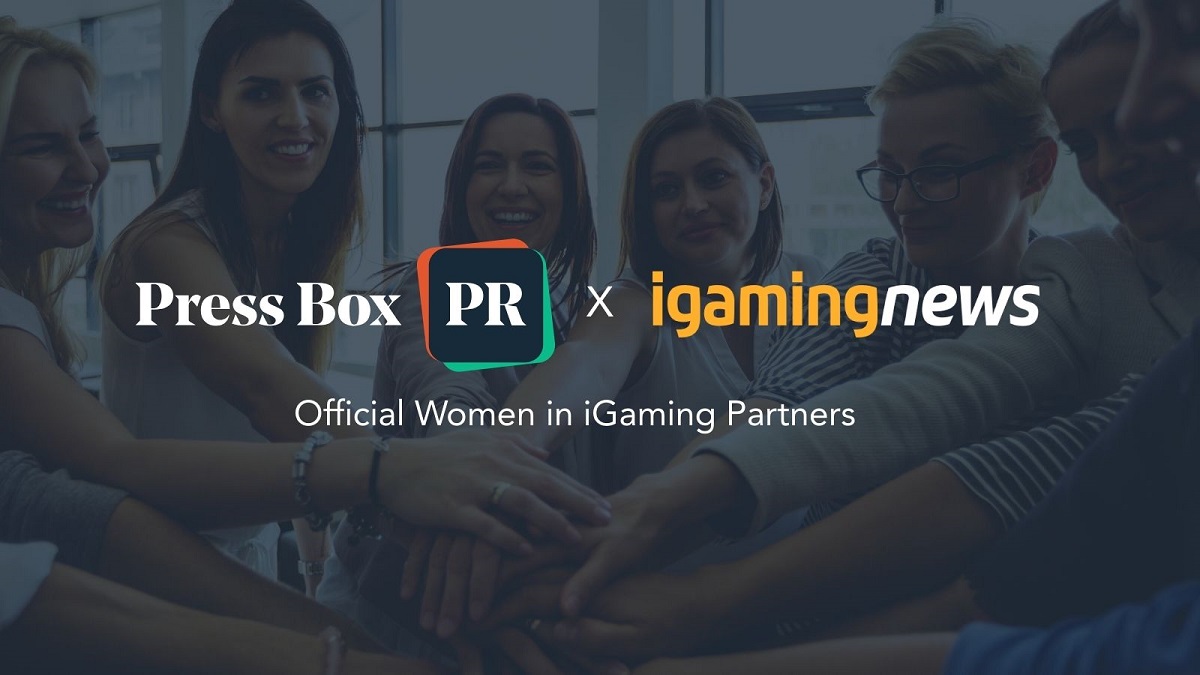
iGaming News is excited to reveal Press Box PR, a top digital and conventional PR firm for the iGaming and sports betting sector, as the official Women in iGaming sponsor of the publication. This collaboration backs iGaming News’ Women in iGaming initiative, a program focused on honoring, showcasing, and elevating the accomplishments of women leaders advancing the industry.
To launch the partnership, iGaming News has unveiled a new category, sponsored by Press Box PR, at its first iGaming News Awards: “Woman of Influence,” highlighting outstanding women who are transforming the industry and fostering innovation.
Abigail Welch, Editor of iGaming News, said: “We are thrilled to welcome Press Box PR as the official sponsor of our Women in iGaming initiative. Their expertise in digital PR will help us bring the incredible stories of women across the industry to a wider audience. This partnership is about celebrating women every day, supporting their achievements and inspiring the next generation of leaders.”
Sarah Williams, B2B account manager for Press Box PR, said: “We’re thrilled to be a part of iGaming News’ Women in iGaming initiative! With International Women’s Day coming up this Sunday as well as March being Women’s History Month, there’s no better time to announce this fantastic partnership. By putting our time, money and effort behind initiatives like Women in iGaming, Press Box PR is showing support all year long, not just on certain days or months.
“While we are certainly seeing more women excelling and leading in the industry, only about 16% of executive-level roles in the sector are held by women, according to the latest 2025 data from the Gambling Survey for Great Britain. I hope that by shining a light on the skilled women in this industry, we can see that representation increase.”
The partnership will feature editorial pieces, interviews, podcasts, and campaign material highlighting women who are shaping history in iGaming, their professional paths, and how they are progressing the industry. Uniting iGaming News’ industry influence with Press Box PR’s digital communication skills and client network, the collaboration aims to amplify women’s voices and enhance recognition for female leaders.
The post Press Box PR Becomes Official Sponsor of Women in iGaming, Backed by iGaming News appeared first on Eastern European Gaming | Global iGaming & Tech Intelligence Hub.
-

 Comatel6 days ago
Comatel6 days agoCOMATEL CELEBRARÁ UNA FIESTA PARA CIENTOS DE OPERADORES TRAS FINALIZAR EL PRIMER DÍA DE LA FERIA ESPAÑOLA, INTERAZAR
-

 Fotini Matthaiou6 days ago
Fotini Matthaiou6 days agoOctavian Gaming Titles Go Live with Novibet in Mexico
-

 Compliance Updates6 days ago
Compliance Updates6 days agoSpillemyndigheden: New Guidance on Responsible Gambling
-

 Amusnet6 days ago
Amusnet6 days agoAmusnet Introduces its “Jackpot Cards Plus” Island at Casino Adjara
-

 Fast Track6 days ago
Fast Track6 days agoFast Track Spark Lands in São Paulo for Advanced Retention Workshop
-

 Betting and Gaming Council6 days ago
Betting and Gaming Council6 days agoBGC: Government Tax Hike Boost for Black Market
-

 Conferences7 days ago
Conferences7 days agoBetConstruct AI to Redefine the Brazilian iGaming Landscape at SBC Summit Rio 2026
-

 Atlaslive6 days ago
Atlaslive6 days agoAtlaslive Shortlisted in Five Categories at GamingTECH CEE Awards 2026





